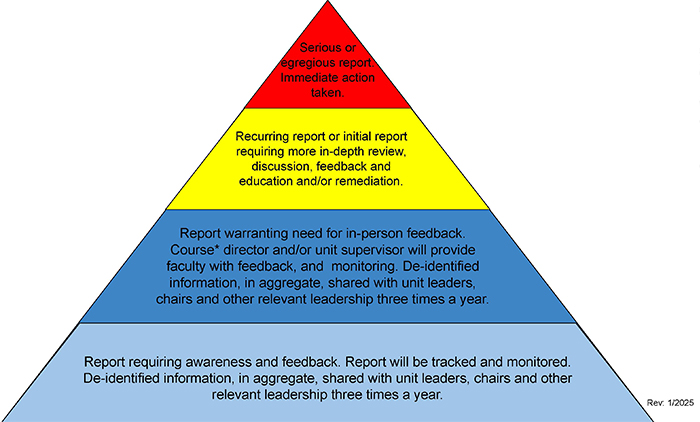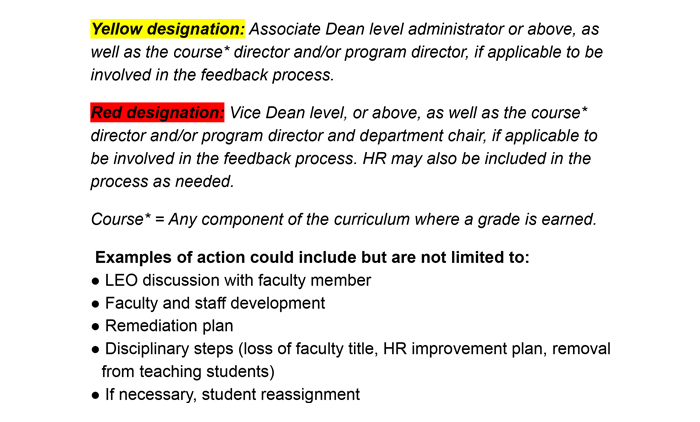We want to recognize what is going well, as well as identify areas for improvement. The Learning Environment Feedback Form can be used for reporting exemplary teaching and positive experiences and reporting concerns like negative learning experiences (i.e. site safety, duty hours, teaching etc.) and mistreatment. The more you provide feedback, the better we can make your experience and the experiences of your peers. Making us aware allows us to advocate on your behalf and make changes.
Mistreatment arises when behavior shows disrespect for the dignity of others and unreasonably interferes with the learning process. It can take the form of physical punishment, sexual harassment, psychological cruelty and discrimination based on race, religion, ethnicity, sex, age or sexual orientation.
AAMC Definition of Mistreatment
- Threatened with physical harm or physically harmed.
- Required to perform personal services.
- Subjected to offensive remarks related to gender, sexual orientation, national origin, race, color, religion, or any other category protected by law.
- Denied opportunities for training or rewards based upon membership in a protected group.
- Subjected to lower evaluations or grades solely because of membership in a protected group.
- Publicly embarrassed or humiliated.
- Subjected to unwanted sexual advances.
- Asked to exchange sexual favors for grades or other rewards.
- Subjected to the threat of revoking visa status for foreign nationals.
Other examples of inappropriate behaviors may include:
- Derogatory comments
- Public shaming
- Behavior that makes you uncomfortable
- Unprofessional conduct
- Inappropriate conduct
For more information, please review the Reporting Mistreatment or Harassment of Medical Students Policy.
Although we do our best to make sure all our programs offer a great learning environment, medical students are our eyes and ears. Sharing your feedback will help us both resolve your issue and create a better, more inclusive environment for all learners. Reporting positive experiences and exemplary teachers helps us create best practices and helps us celebrate those who contribute in a positive way to our learning environment.
All reports will be confidential. The only people who will know your identity are the LEO Consultant and LEO Liaison. Anonymous reports are not accepted because the identity of the reporter is unknown, which does not allow the report to be fully investigated and therefore, we cannot work with you to resolve the problem. The more information we have, the better we are equipped to respond and develop an appropriate course of action.
We realize reporting a concern can be a difficult and uneasy situation. LEO is your partner and will do our best to honor your boundaries and work with you on how to proceed in a way that is safe and comfortable.
Every situation is different, and we take every feedback form submitted seriously. Positive learning experience reports and exemplary teaching reports are handled with the standard faculty feedback flow. Mistreatment and negative learning experience reports are reviewed by the Learning Environment Workgroup for potential action. Any action considered will not be implemented until the student grade is posted, to avoid grading bias, unless the reporter selects an alternate time frame or report is egregious where immediate action is necessary. We want to assure students that there is zero tolerance for retaliation or retribution of any kind.
In most cases, the process is as follows: Learning Environment Reporting and Receipt Process (PDF).
Learning Environment Workgroup Members:
- Jane Korn, Learning Environment Office Consultant
- Lauren Skinner, Learning Environment Office Liaison
- Glen Fogerty, Vice Dean, Undergraduate Medical Education
- Irene Alexandraki, Senior Associate Dean, Undergraduate Medical Education
- Francisco Lucio, Senior Associate Dean
- Invited Guests, as needed
The Feedback Dashboard contains a summary of submissions. When the status of a report is changed, the reporter will receive an email update.
The submitted form is only sent to the LEO Consultant and LEO Liaison. The LEO Consultant will be the person to contact you to discuss your report and provide you options for resolution. The LEO Liaison is responsible for de-identifying (making anonymous) reports for tracking purposes.
Reporting Options
- Learning Environment Feedback Form
- University of Arizona Office of Institutional Equity (includes Title IX):
- Phone 520-621-9449.
- Email: @email
If you are seeking guidance, please consult on of the following who are considered primary resources:
- Learning Environment Office
- Course* directors.
- Dean student affairs, or respective designee.
- Curricular dean(s).
- Vice dean, undergraduate medical education, or respective designee.
- Director, student development.
- Students on away rotations should report to the course* director at the site or to the above College of Medicine – Phoenix resources.
- Career and professional advisors.
- University of Arizona - Office of Ombuds.

